Related Research Articles

Aldous Leonard Huxley was an English writer and philosopher. His bibliography spans nearly 50 books, including novels and non-fiction works, as well as essays, narratives, and poems.

Christopher William Bradshaw Isherwood was an Anglo-American novelist, playwright, screenwriter, autobiographer, and diarist. His best-known works include Goodbye to Berlin (1939), a semi-autobiographical novel which inspired the musical Cabaret (1966); A Single Man (1964), adapted as a film by Tom Ford in 2009; and Christopher and His Kind (1976), a memoir which "carried him into the heart of the Gay Liberation movement".

John William Van Druten was an English playwright and theatre director. He began his career in London, and later moved to America, becoming a U.S. citizen. He was known for his plays of witty and urbane observations of contemporary life and society.

Salka Viertel was an Austrian actress and Hollywood screenwriter. While under contract with Metro-Goldwyn-Mayer from 1933 to 1937, Viertel co-wrote the scripts for many movies, particularly those starring her close friend Greta Garbo, including Queen Christina (1933) and Anna Karenina (1935). She also played opposite Garbo in MGM's German-language version of Anna Christie in 1930.
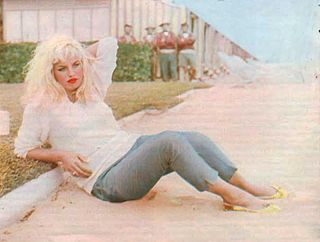
Barbara Valentin was an Austrian actress. She worked in film, often with Rainer Werner Fassbinder.
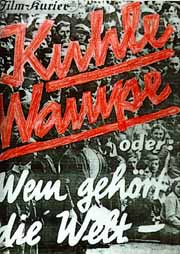
Kuhle Wampe is a 1932 German feature film about unemployment, homelessness and left wing politics in the Weimar Republic produced by Prometheus Film. The script was conceived and written by Bertolt Brecht. He also directed the concluding scene: a political debate between strangers on a train about the world coffee market. The rest of the film was directed by Slatan Dudow. The film music was composed by Hanns Eisler.

Katharina Thalbach is a German actress and stage director. She played theatre at the Berliner Ensemble and at the Volksbühne Berlin, and was actress in the film The Tin Drum. She worked as a theatre and opera director.

Vishnudevananda Saraswati was an Indian yoga guru known for his teaching of asanas, a disciple of Sivananda Saraswati, and founder of the International Sivananda Yoga Vedanta Centres and Ashrams (ISYVC). He established the Sivananda Yoga Teachers' Training Course, possibly the first yoga teacher training programs in the West. His books The Complete Illustrated Book of Yoga (1960) and Meditation and Mantras (1978) established him as an authority on Hatha and Raja yoga. Vishnudevananda was a peace activist who rode in several "peace flights" over places of conflict, including the Berlin Wall prior to German reunification.
Girish Chandra Ghosh was a Bengali actor, director, and writer. He was largely responsible for the golden age of Bengali theatre. He cofounded the Great National Theatre, the first Bengali professional theatre company in 1872, wrote nearly 40 plays and acted and directed many more, and later in life became a noted householder disciple of Sri Ramakrishna.
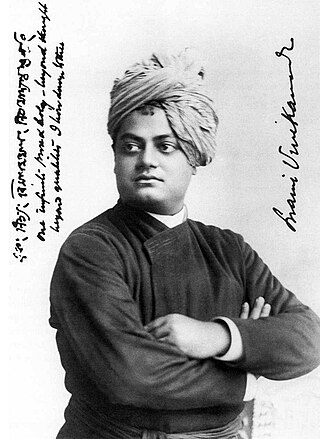
Vedanta Societies refer to organizations, groups, or societies formed for the study, practice, and propagation of Vedanta, the culmination of Vedas. More specifically, they "comprise the American arm of the Indian Ramakrishna movement" and refer to branches of the Ramakrishna Order located outside India.

Nina Hoss is a German stage and film actress. She is known for her collaborations with director Christian Petzold in films such as Barbara (2012) and Phoenix (2014). In addition, she also performed roles in The White Masai (2005) and The Audition (2019), and Pelican Blood (2020). She has also starred in the American TV series Homeland (2014–2017), The Defeated (2020), and Tom Clancy's Jack Ryan (2022).

Ursula Cain was a German dancer and dance teacher.
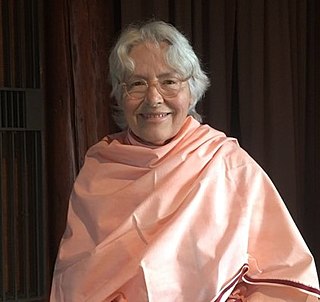
Pravrajika Vrajaprana is a sannyasini or pravrajika at the Vedanta Society of Southern California, affiliated with the Ramakrishna Order. She resides at Sarada Convent in Santa Barbara, California and a writer on Vedanta, the history and growth of the Vedanta Societies.
Irma Ursula Johanna Richter (1886–1946) was a German photographer who specialized in dance and theatre photography in Dresden.

Gerda Müller was a German stage actress.

Built and dedicated in 1956, the Santa Barbara Vedanta Temple is located on a 45-acre (18 ha) property situated between the foothills above the City of Santa Barbara and below the peaks of the Santa Ynez Mountains. The temple has a clear view overlooking the Pacific Ocean and the Channel Islands of California.
Günther Birkenfeld was a German writer. His books were banned during the Nazi years but he remained in the country and was conscripted for aircraft monitoring during the war. During the postwar period, in what had become the Soviet occupation zone, he was a co-founder, in 1948/49, of the anti-communist Combat Group against Inhumanity .
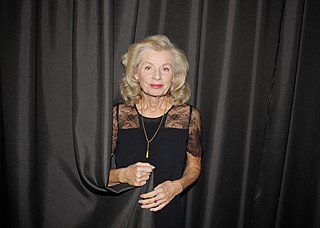
Christine Mielitz is a German theatre and opera director.

Helena Forti was a dramatic soprano active 1906 – 1924, closely associated with the Dresden royal court opera, known for her beauty, voice and strong stage presence. She sang all Wagner's opera heroines, in Dresden, Bayreuth and internationally. Other repertoire included the title role in Verdi's Aida, Santuzza in Mascagni's Cavalleria and contemporary works such as Marietta in Korngold's Die tote Stadt. She created the role of Myrtocle in d'Albert's Die toten Augen. Her Sieglinde in Die Walküre in Braunschweig was described by the Neue Zeitschrift für Musik as "Equally endowed with youth, beauty and vocal means... (Forti) immerses herself so intensely in her role that one believes the transformation of the virgin-Goddess into a human form." After retiring from the stage she taught voice and acting in Gera, Düsseldorf and Vienna. She died in Vienna, where she lived with her stage director and Intendant husband, Walter Bruno Iltz.
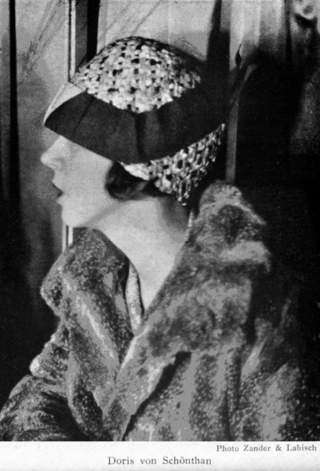
Doris von Schönthan (1905–1961), born Maria-Dorothea Ehemann, called 'Dorinde', was a German model, a copywriter, journalist and photographer. She is characterised as a dazzling figure of the Weimar Republic or bohemian of the Roaring Twenties.
References
- 1 2 3 4 5 Tipple, Edith (April 16, 2012). "An Extraordinary Life". Santa Barbara Independent. Retrieved 14 December 2023.
- ↑ Schneider, Hansjörg (2003). Dresden Theatre, 1933-1945. Berlin, Germany: Henschel Verlag. ISBN 3-89487-456-2.
- ↑ Schirmer, Lothar (1991). "Aus Trümmern erstanden: Theater in Deutschland nach dem Zweiten Weltkrieg". 36. Berlin, Germany: Gesellschaft für Theatergeschichte. p. 71. ISSN 0176-8905.
- ↑ Kantorowicz, Alfred (1979). "Alfred Kantorowicz: East and West: Contributions to cultural and political questions of the period 1947-1949". Vol. 2. Athenaeum Publishing House. p. 89.
- 1 2 Bardach, Ann Louise (April 11, 2012). "Gerda Ursula Zinn (Ambika): 1913-2012". Santa Barbara Independent. Retrieved 14 December 2023.
- 1 2 "Gerda Zinn (1914-2012)". Seattle, Washington: IMDb.com, Inc. 2023. Retrieved 2023-12-18.